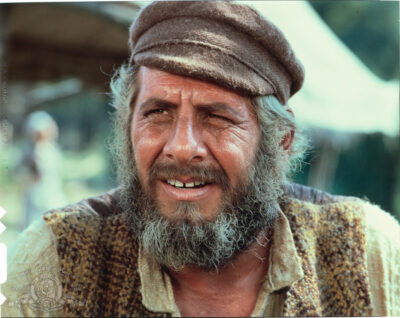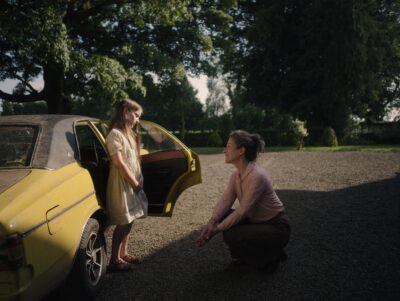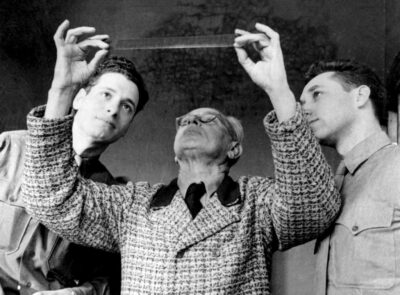
Farewell, Chaim Topol.


The Oscar race is in the final stretch. Almost all of the major guilds have spoken (the WGA awards are this Sunday) and Everything Everywhere All at Once is looking unbeatable. However…every year there are two or three surprises and doubtless 2023 won’t be an exception. The question is, do you think you can divine the surprises? Cate Blanchett instead of Michelle Yeoh for Best Actress? Spielberg instead of the Daniels for Best Director? Bill Nighy or Austin Butler instead of Brendan Fraser for Best Actor? There are so many possible ways this can go, you should weigh in! I mean, the stakes could not possibly be lower!
If you, dear moviegoer, can accurately predict how the members of the Academy of Motion Picture Arts & Sciences will vote in all 23 categories, (or close to it), you will win movie passes good at all Laemmle venues! The 95th Academy Awards take place on Sunday, March 12 and we’ll announce the winners soon afterwards. Good luck!
Happy to report we are opening Close, the Dutch/Flemish film about the intense friendship of two 13-year-old boys, this Friday in Santa Monica and March 3 in Santa Clarita, Claremont, and Encino. Acclaimed at the most prestigious festivals around the world and now up for an Academy Award, Close is a “sharply observed, heartbreaking masterpiece” (G. Allen Johnson, San Francisco Chronicle). Other critics have gushed:
“To the pantheon of films about the pains of leaving childhood behind — The 400 Blows, The Spirit of the Beehive, Rocks, The Go-Between, Boyhood et al — we should find a spot for this beautiful elegy of lost innocence from Belgian director Lukas Dhont.” ~ Philip De Semlyen, Time Out

“It features world-wise performances from its cast, a haunting score from composer Valentin Hadjadj and breathtaking cinematography from Malte Rosenfeld. It’s a treasure you’ll never forget.” ~ Randy Myers, San Jose Mercury News
“A picture which is intimate in scope but which packs a considerable emotional wallop.” ~ Wendy Ide, Screen International
We are also thrilled to open The Quiet Girl, the Irish film about a young girl in foster care, March 3 in Santa Monica and March 10 in Claremont, Encino, Santa Clarita and Glendale.
“Few films explore both the shelter and the solitude of silence with the eloquence of Colm Bairéad’s gently captivating Irish-language drama The Quiet Girl.” ~ David Rooney, Hollywood Reporter


“There may not be a movie more expressive of the season’s benevolent ethos than this hushed work about kith and kindness.” ~ Lisa Kennedy, New York Times
“One of the most exquisitely realised films of the year.” ~ Wendy Ide, Guardian
The Oscar nominations are out, and in spite of the fact that Hallelujah, Nope, RRR and Decision to Leave, Dolly De Leon, Viola Davis, Paul Dano, and Danielle Deadwyler were inexplicably excluded, at least Brian Tyree Henry and Judd Hirsch were honored. Anyway, it’s time for our Umpteenth Annual Laemmle Oscar Contest! If you, dear moviegoer, can accurately predict how the members of the Academy of Motion Picture Arts & Sciences will vote in all 23 categories, (or close to it), you will win movie passes good at all Laemmle venues! The 95th Academy Awards take place on Sunday, March 12 and we’ll announce the winners soon afterwards. Good luck!
And the Top Ten Customer-Chosen films of 2022, in order from 1 to 10, are [drum roll]:
It’s a terrific list, arguably better than the one AMPAS announced this week, which excluded RRR, Nope, Aftersun and Decision to Leave. Films 2-4 and 9, hyperlinked for your convenience, are still in theaters!
Keep those Top Ten contest entries coming. You have until this Sunday, January 22 to give it some thought and enter here. So far, unsurprisingly, it looks like many Laemmle moviegoers are kvelling about Everything Everywhere All at Once, Top Gun: Maverick, and RRR. We’ll have final results next week. You can read Greg Laemmle’s list and leading American film critics’ lists if you need inspiration. Personally, my favorite is Jordan Peele’s spectacular Nope. No doubt my reaction was influenced by the fact that I saw it in a packed, sold-out theater on opening night, because movies are better in theaters!
Have you caught up on the 2022 movies you wanted to see? Regardless, it’s time to submit your Top Ten lists. Tell us which films you liked best here and you’ll be entered into a raffle for free Laemmle gift cards! If you need inspiration, here’s Greg Laemmle on the state of arthouse moviegoing and his favorite features of the last year, with some thoughts about each:
“At some level, the best that can be said is that at least we were open for all twelve months of the year. And after 2020 and 2021, that was a positive. But given that the year both started and ended with Omicron surges, the movie exhibition sector is still not in a post-Covid environment.
Happy New Year! We’re welcoming 2023 with five powerful titles in our long-running Culture Vulture series: The Super 8 Years; Children of the Mist; Filmmakers for the Prosecution screening with Nuremberg: Its Lesson for Today; and Geographies of Solitude.
The Super 8 Years, January 23 & 24: One of France’s most respected contemporary writers, 2022 Nobel Prize laureate Annie Ernaux’s intimate and autobiographical body of work captures the inner lives of women alongside societal and cultural changes in France from the 1960s onwards. A natural extension of her literary work in its form and content, The Super 8 Years shows the pastimes, lifestyle and aspirations of a social class in post-1960s France through the lens of the Ernaux family archive. Read Manohla Dargis’ rave review in the New York Times: “The film’s images have faded, but the memories they’ve stirred up are vivid and full of feeling…short, potent, quietly elegiac.”
Children of the Mist, January 30 & 31: In a village hidden in the mist-shrouded Northwest Vietnamese mountains resides an indigenous Hmong community, home to 12-year-old Di, part of the first generation of her people with access to formal education. A free spirit, Di happily recounts her experiences to Vietnamese filmmaker Diễm Hà Lệ, who planted herself within Di’s family over the course of three years to document this unique coming of age. “Diem’s intimate access and sensitive approach, together with editor Swann Dubus’ keen eye for texture and detail, make for a compelling and eye-opening drama.” ~ Nikki Baughan, Screen Daily
Filmmakers for the Prosecution screening with Nuremberg: Its Lesson for Today, February 6 & 7: Filmmakers: Near the end of WWII, filmmaker John Ford, head of the Field Photographic Branch of the OSS, assigns the Schulberg brothers to carry out a special mission: track down German footage and photographs of Nazi atrocities in order to convict the leaders scheduled to stand trial. Nuremberg: One of the greatest courtroom dramas in history, the film shows how prosecutors built their case against Nazi war criminals using their own films and records. “Haunting and vivid. What this documentary shows is how a vital and indispensable principle of humanity was restored.” [on Nuremberg] – A. O. Scott, New York Times

Geographies of Solitude, February 13 & 14: An immersion into the rich ecosystem of Sable Island, a remote sliver of land in the Northwest Atlantic, the film follows Zoe Lucas, a naturalist and environmentalist who has lived there for over 40 years collecting, cleaning and documenting marine litter that persistently washes up on the island’s shores. Shot on 16mm and created using eco-friendly filmmaking techniques, Geographies of Solitude is a playful and reverent collaboration with the natural world filled with arresting images and made with an activist spirit. “A work of art.” – Marc Glassman, POV Magazine “A beguiling and poetic film.” – Wendy Ide, Screen Daily

Tickets for all the films are now on sale. Couple changes: west side Culture Vulture screenings are now at the Monica Film Center instead of the Royal and the Monday screenings will start at 7 PM instead of 7:30 PM. Also screening at our Glendale and Santa Clarita theaters.
